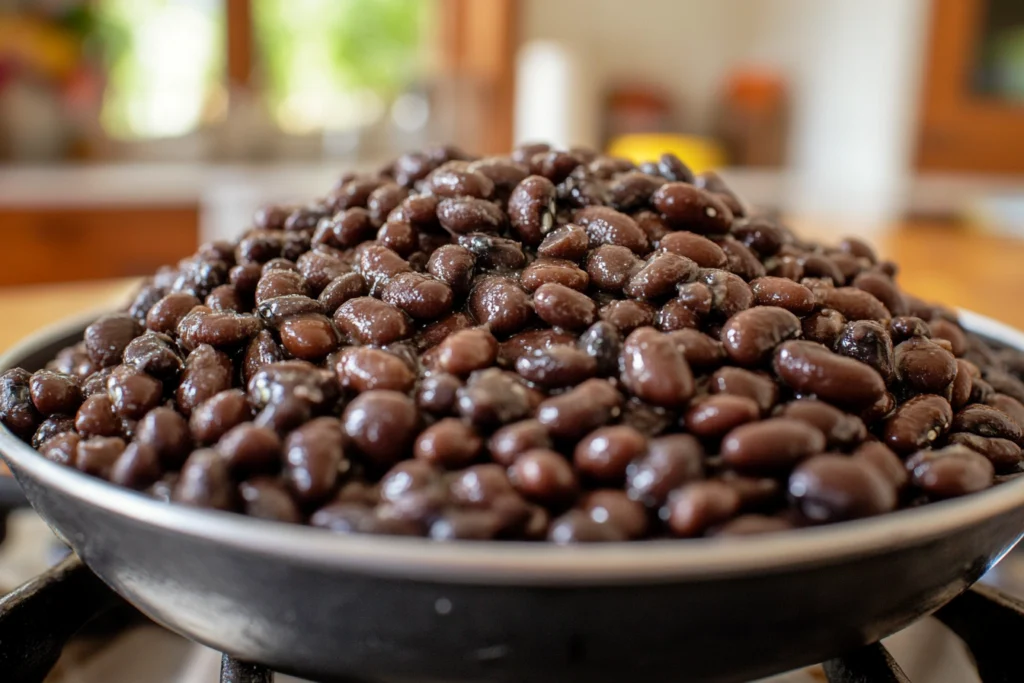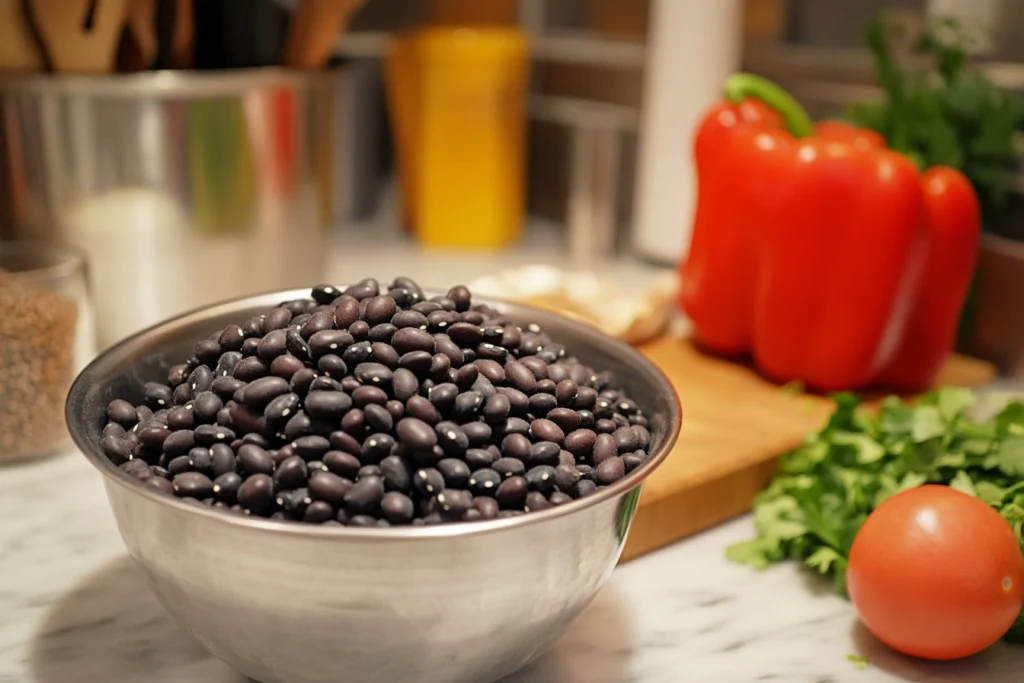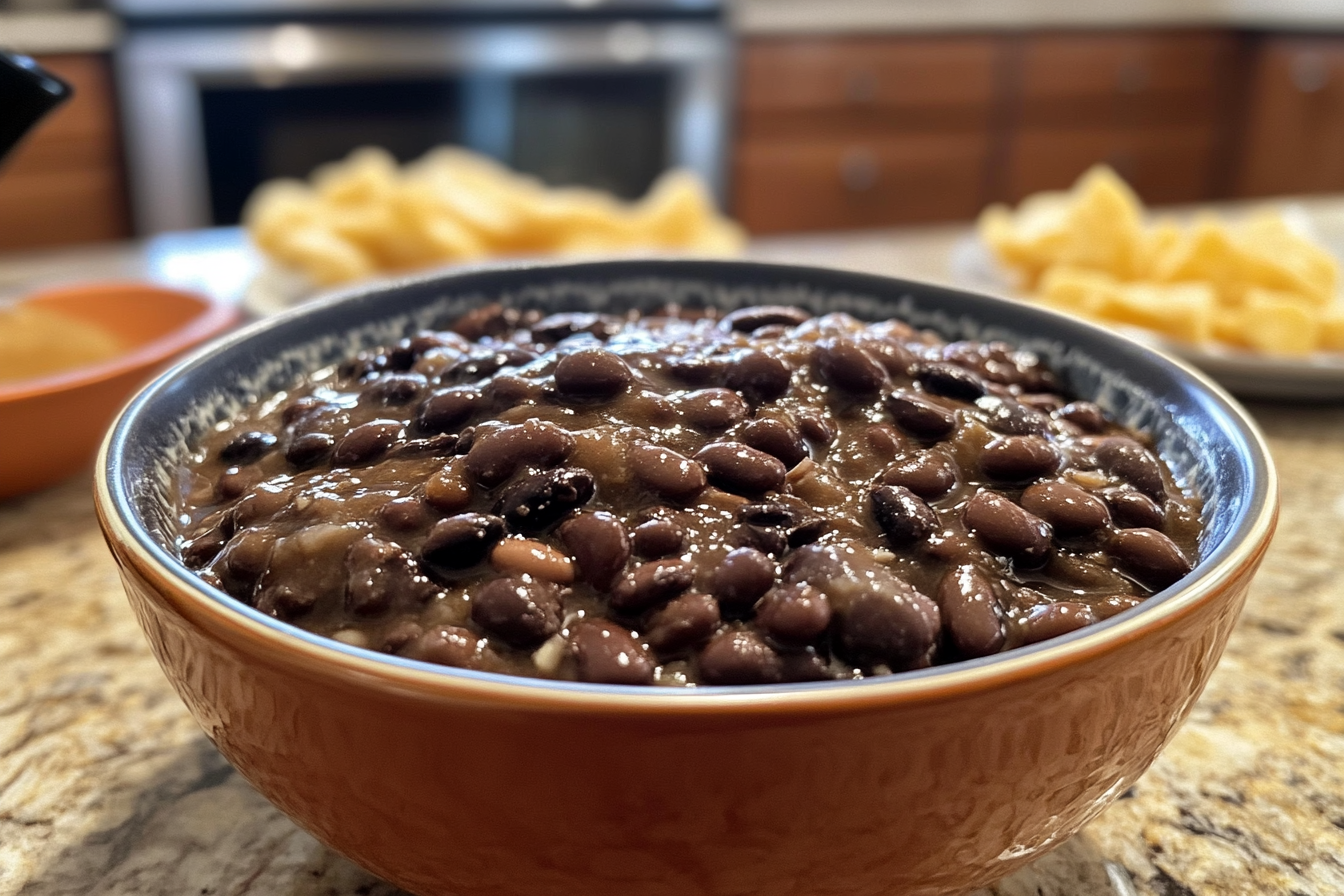Here’s What I Learned (and What You Should Know)
When I first started following a gluten-free diet, I had so many questions. One that kept popping up: Are black beans gluten-free? I’d see them everywhere—tucked into burritos, stirred into soups, even blended into brownies. But I wasn’t sure if they were safe for my diet.
After some deep diving (and a lot of label reading), I’ve got the answers. So if you’re wondering whether black beans belong in your gluten-free lifestyle, let me break it down for you—clearly, concisely, and from experience.
Why I Love Black Beans (and Why They’re a Gluten-Free Favorite)
Let’s start with the basics. Black beans have always been a staple in my kitchen. I use them in:
- Tacos and burritos
- Hearty stews
- Salads and bowls
- Even homemade veggie burgers
They’re naturally rich in fiber, plant-based protein, iron, and antioxidants. Plus, they’re incredibly filling without being high in fat.
And best of all? Yes—black beans are naturally gluten-free.
What Gluten Is and Why It Matters
If you’re gluten-free like me—whether due to celiac disease, gluten sensitivity, or just trying to feel better—then you know gluten is the enemy.
Gluten is a protein found in:
- Wheat
- Barley
- Rye
Black beans aren’t a grain—they’re a legume—so they don’t naturally contain gluten. The key word, though, is naturally.
The Real Problem: Cross-Contamination
Even though black beans don’t contain gluten themselves, they can pick it up during processing. Here’s how:
- Shared factory equipment (used for wheat or barley products)
- Cross-contact during storage or shipping
- Grocery store bulk bins (where scoops and containers might get mixed)
I always choose packaged black beans that are labeled “Certified Gluten-Free.” That way, I know they’ve been tested and verified to contain less than 20 parts per million (ppm) of gluten—which is safe for most of us with gluten issues.
Canned vs. Dried Black Beans: Which Is Safer
I’ve used both, and here’s what I’ve learned:
Dried Black Beans
- Naturally gluten-free
- No additives
- Minimal processing
- Risk of cross-contamination during packaging or bulk storage
Canned Black Beans
- Convenient and pre-cooked
- Some are labeled “gluten-free”
- Can contain additives like flavorings, thickeners, or modified food starch (which might include gluten)
I always check the ingredient list. If there’s anything other than “black beans, water, and salt,” I get a little suspicious.
How to Pick the Right Brand
These are my go-to brands when I want to make sure I’m staying safely gluten-free:
- Eden Foods – Organic, gluten-free, BPA-free cans
- Bush’s Best – Most varieties are gluten-free (check the label)
- Amy’s Organic – Known for clean, gluten-free ingredients
- Thrive Market – Carries both canned and dried certified options
Pro tip: Avoid buying black beans from bulk bins. Cross-contamination risk is high, and I’ve had issues in the past.
What About Black Bean Products?
This one threw me for a loop when I first started out. Products made with black beans aren’t always gluten-free. Here’s what I learned:
BlackBean Pasta
- Usually gluten-free
- BUT some brands sneak in wheat flour—always read the label
Black Bean Chips
- Often gluten-free
- Watch for wheat starch or barley malt
Black Bean Flour
- Naturally gluten-free
- Risk of cross-contamination in non-dedicated mills
Bottom line: Just because it’s made from black beans doesn’t mean it’s automatically gluten-free. I look for that certified gluten-free label every time.
How I Cook Gluten-Free Black Beans at Home
Making them from scratch has been a game-changer for me. Not only is it safer, but the flavor and texture are incredible.
Here’s how I cook them:
- Sort and rinse the beans thoroughly
- Soak overnight (this helps reduce bloating too)
- Simmer for 60–90 minutes until tender
- Season smart – I use cumin, garlic, bay leaves, and gluten-free broth
No weird additives. No mystery seasonings. Just whole, healthy beans I can trust.
My Favorite Gluten-Free Black Bean Recipes

🥣 Hearty Black Bean Soup
- Black beans, garlic, tomatoes, cumin, and gluten-free veggie broth
- Simple, warming, and full of fiber
🥗 Zesty Black Bean Salad
- Black beans, corn, bell peppers, avocado, lime, and cilantro
- Great for meal prep or a light lunch
🍔 Homemade Black Bean Burgers
- Mashed black beans, gluten-free oats or breadcrumbs, egg, spices
- I freeze extras for easy weeknight dinners
Can You Eat Black Beans at Restaurants?
Sometimes. But it’s tricky.
Here’s what I do to stay safe:
- I ask the server if the black beans are prepared without wheat-based seasonings or broths
- I avoid buffet-style setups—cross-contamination risk is too high
- I stick to plain black beans over “flavored” or “refried” varieties
Some restaurants do it right, especially authentic Mexican or Latin spots. But I’ve learned not to assume. Always ask!
Storage Tips I Follow
If you’re meal prepping like I do, storage matters.
Dried Beans
- Keep in a sealed container in a cool, dry pantry
- Last up to 2 years
Canned Beans
- Unopened: 2–3 years in a pantry
- Opened: Store in an airtight container in the fridge for 3–5 days
Cooked Beans
- I freeze them in batches for up to 6 months
- Reheat with a splash of water or broth to keep them moist
Black Beans and Digestion: What You Should Know
Let’s be honest—beans can cause gas and bloating. I’ve been there.
Here’s how I handle it:
- Soak overnight (game-changer)
- Rinse canned beans thoroughly before cooking
- Add digestive spices like cumin, fennel, or ginger
- Start with small servings and work your way up
If you have IBS or follow a low-FODMAP diet, be cautious. Smaller portions or alternatives might work better for you.
What Nutritionists Say About Black Beans on a Gluten-Free Diet
I’ve talked to dietitians and read the studies—here’s the consensus:
- Black beans help replace fiber and protein lost when cutting gluten
- They support gut health and balance blood sugar
- They’re one of the best plant-based protein sources you can eat
According to a 2021 study, people with celiac disease who ate legumes like black beans had better gut microbiome diversity and improved digestion. That sold me.
Myth-Busting: Common Black Bean Misconceptions
Let’s clear a few things up:
❌ Myth 1: Black beans contain gluten
✅ Truth: They are naturally gluten-free
❌ Myth 2: All canned black beans are safe
✅ Truth: Some have gluten-based additives—check the label!
❌ Myth 3: If it doesn’t say “gluten-free,” it must be unsafe
✅ Truth: Many dried beans are safe but just not certified
How Black Beans Compare to Other Beans
Here’s how black beans stack up against their legume cousins:
| Bean Type | Gluten-Free? | Protein (1 cup) | Fiber (1 cup) |
|---|---|---|---|
| Black Beans | ✅ Yes | 15g | 15g |
| Pinto Beans | ✅ Yes | 14g | 15g |
| Kidney Beans | ✅ Yes | 13g | 11g |
| Navy Beans | ✅ Yes | 15g | 19g |
All are great, but I love the balance that black beans offer in both taste and nutrition.

FAQs About Black Beans and Gluten-Free Eating
Q: Can I eat black bean pasta?
A: Yes—if it’s labeled gluten-free. Some brands mix in wheat flour.
Q: Are black bean burgers gluten-free?
A: Sometimes. Many use breadcrumbs or wheat. Look for certified gluten-free versions or make your own.
Q: Is black bean flour gluten-free?
A: It should be—but make sure it’s processed in a gluten-free facility.
Q: What about refried black beans?
A: Some are safe, others aren’t. Many store-bought or restaurant versions use thickeners or seasonings with gluten.
Q: Should I eat black beans every day?
A: They’re super healthy, but as with anything—balance is key.
So… Should You Eat Black Beans on a Gluten-Free Diet?
Absolutely.
Here’s the final verdict:
Naturally gluten-free
Rich in plant-based protein and fiber
Safe when you choose certified brands or cook from scratch
They’re easy to incorporate into meals, incredibly nutritious, and can help fill in nutritional gaps left behind when you ditch wheat.
If you’re living gluten-free like I am, black beans are not just safe—they’re a smart choice. And once you get the hang of cooking them right, you’ll never look back.

